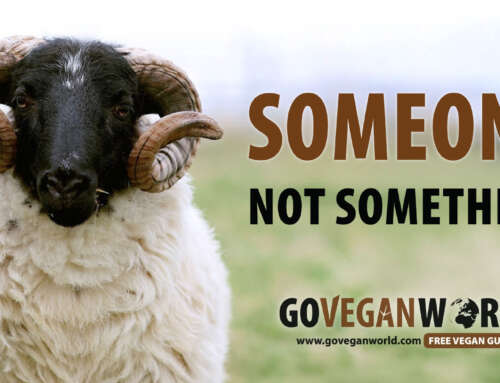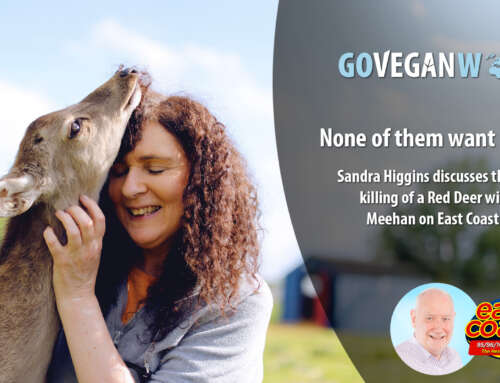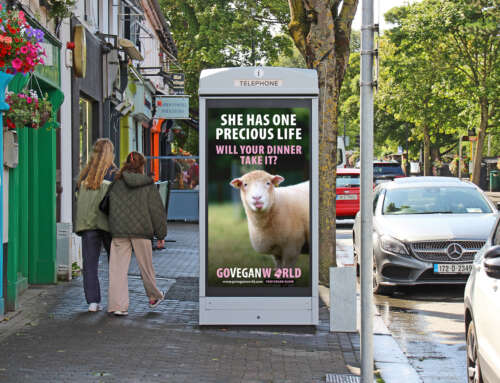Meat and Dairy Facts, a joint initiative between Irish animal agriculture and the state agency, An Bord Bia, launches today. The campaign spokesperson, Eddie Punch (General Secretary of the Irish Cattle and Sheep Farmers Association) was interviewed by Shane Colemanon Newstalk Radio with Sandra Higgins of Go Vegan World.
It was noted that 50% of the Irish population are considering going vegan which is testament to the work of vegan education and animal rights activism in Ireland. Given the increasing number of people who are researching animal rights and, as a consequence, choosing to be vegan so they no longer exploit them, and given the rapid rise in the consumption of vegan alternatives to animal products (e.g. a 70% increase in the sale of plant milks), the animal agricultural industry is running scared. In fact, they have run into the arms of Red Flag, a company that has previous expertise in promoting unethical products to the public through its work for the Tobacco Industry.
Eddie Punch debated with Go Vegan World in 2015 when we first launched in Ireland. He had nothing new to say today: his statements on the superior quality of nutrients in grass fed animals are not factual. The science is quite clear in its statement that humans have no nutritional needs that cannot be met on a 100% plant diet; a plant diet is suitable for all stages of life and it can prevent and treat several diseases such as heart disease, obesity, type II diabetes and some cancers. A number of reports in the last few years, including the two Lancet reports released in early 2019 (Food in the Anthropocene and The Global Syndemic of Obesity, Undernutrition and Climate Change), as well as a number of reports on the environment such as the Oxford Martin study and the work of Joseph Poore), all concur that in order to sustainably feed a growing population, taking into account human health and nutritional requirements, we need to urgently transition to plant agriculture.
The Meat and Dairy Facts campaign is not factual: growing crops to feed animals who are bred to be slaughtered for their eggs, dairy and flesh is economically inefficient, unsustainable, catastrophic for the environment and the climate, and unethical. We can produce up to twenty times more food if we consume plants directly rather than recycling crops and resources through the bodies of other animals and taking animal products from them.
The plant diet aspect of veganism is just one part of how vegans live by respecting the rights of other animals not to be bred, owned, exploited or killed. The public is rapidly becoming aware of the injustice of farming animals for products that we can easily get from plants and other vegan alternatives. It has never been easier for people in the Western World to be vegan. For anyone who is concerned that a vegan diet is nutritionally inadequate, please refer to objective science instead of looking to the industry that profits from our ignorance by telling us that their products are necessary for our health. In fact it is unconscionable for a state agency such as An Bord Bia to promote the very products that are leading us into a climate catastrophe that we will not recover from. As long as we eat a wholefoods diet that includes fruit, vegetables, wholegrains and protein foods (such as pulses, nuts, seeds, plant milks and other fortified foods such as nutritional yeast) and as long as we eat sufficient calories, a plant diet gives us all the nutrients we need for health without harming other animals. For anyone who is a little nervous that they might not be getting all the nutrients they need, it is very easy and cheap to take a daily supplement or to include plenty of fortified foods such as plant milk and nutritional yeast. After all, supplements are widely used in the animal agricultural industry (e.g. mineral blocks, calcium injections, spreading calcium and magnesium on the grass that cows eat, and B12 supplements); isn’t it more ethical for us to take a supplement than to give them to the animals who are bred to be killed?
More research is needed to produce foods veganically without using any animal products (such as animal manure) and technology such as hydroponics may serve us very well when the climate becomes inhospitable to growing food. It is these developments that we need to focus on rather than finding alternative ways to keep doing the wrong thing by trying to find more environmentally friendly ways of farming other animals as food. A report published in earlier in 2019 by researchers at Harvard University, Eating Away at Climate Change with Negative Emissions, Repurposing UK Agricultural Land to meet Climate Goals, shows that restoring land to forestry and growing crops to feed humans instead of to feed farmed animals, would result in a country like the UK becoming self-sufficient and meeting its GHG emission targets. The same is true of Ireland where we currently need to fertilise grass and add supplements to the diets of farmed animals in order to meet the nutritional needs of people who consume a non-vegan diet. Ireland uses very little of its land to produce plant foods and its current rate of GHG emissions from the agricultural sector is the highest in Europe, largely attributable to the industries being promoted by the Meat and Dairy Facts campaign.
Finally, Mr Punch played the animal welfare card. How other animals are treated while they are being exploited and bred to be killed is irrelevant when we are killing them unnecessarily in the first place. They are able to experience positive and negative physical and psychological feelings; they are aware of their lives and have an interest in not being harmed and killed. Therefore they share our fundamental right not to be owned, exploited or killed. In a recent interview Mr Punch stated that “we can’t have enough live exports.” If anyone still believes that farming animals is anything but an atrocity, this is a telling statement.
If farming organisations had the interests of other animals at heart, they would stop using them as commodities.
If they had the interests of the general public at heart, they would not promote foods that are unnecessary for human health and disastrous for the environment.
If they had the interests of farmers at heart, they would ensure that they transitioned to an ethical, sustainable method of farming. That is not attainable from animal agriculture but it is from plant agriculture.
It’s time to stop fighting each other and focus on the vegan solution.
You can listen to the interview here.





